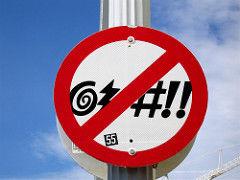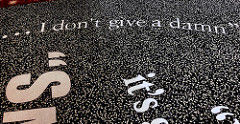Deception
Are People Who Swear Honest or Dishonest?
The debate about swearing and honesty continues.
Posted August 29, 2018 Reviewed by Ekua Hagan

Swearing and bad language are usually frowned upon, but is there a positive side to profanity?
In a previous post, I discussed a series of studies (Feldman, Lian, Kosinski, & Stillwell, 2017) that claimed to show that profanity is a sign of honesty. However, I pointed out that the results of the first of these studies actually showed that the opposite–that people who admitted to using more profanity were more likely to be dishonest than those who avoid such language.
Coincidentally, another group of researchers came to the same conclusion and published a detailed rebuttal (de Vries et al., 2018a). This led to a rejoinder by the first author of the original paper (Feldman, 2018) that argues that there are at least two different kinds of honesty and that although profanity may go along with dishonesty in one sense, it may indicate genuine honesty in another sense.
Feldman’s argument is not very convincing, as it has serious flaws. Nonetheless, the idea that there may be different kinds of honesty is intriguing and it remains possible that profanity might go along with honesty in very limited contexts, especially less socially desirable ones.
As I mentioned in my previous post, there has been debate about what profanity reveals about character. On the one hand, swearing and bad language are often considered offensive and therefore a sign of deviance from social norms of politeness. Hence, a person who frequently swears might show a disregard for social norms more generally, including a willingness to cheat and tell lies when it suits them.
On the other hand, some have argued that profanity is often used to express strong emotion, and therefore may indicate how strongly a person feels about something. Hence, it has been argued that swearing and bad language may be a sign of authenticity, that is, being honest about how one really feels about a situation.
To determine which of these views is closer to the truth, Feldman et al. (2017) performed a series of studies testing the relationship between the use of profanity and measures of honesty. For the purpose of this post, the first of their three studies is the most important.
In this study, participants reported how frequently they use various rude words and completed a measure of social desirability, the Eysenck Lie scale. The latter assesses whether a person claims to engage in socially desirable behaviors, such as always keeping their promises, never littering, and so on. The original idea is that in real life, people don’t always keep their promises, litter more than they want to admit, etc, and that people who claim that this does not apply to them are lying to create a virtuous impression of themselves.
Feldman and colleagues accepted this interpretation and argued that participants who scored highly on the measure were more dishonest. Furthermore, they found that participants’ reported use of profanity was inversely related to their Lie scales scores, i.e., people with more socially desirable scores reported less profanity, while people with lower scores reported more. Hence, the authors argued that this showed that people who swear more often are therefore more honest.
Or are they?
The problem with Feldman et al.’s conclusion is that the Lie scale does not measure what it is supposed to measure. In fact, multiple studies have shown that people who score highly on the Eysenck Lie scale have been shown to be more not less honest on a variety of measures. That is, unbelievable as it may seem, people who claim that they always keep their promises, etc. are not lying!
Additionally, there is evidence that these people are less likely to tell lies in general. Conversely, people with lower scores on this measure are also more likely to engage in dishonest behavior such as lying and cheating. In their reply to Feldman et al.’s article, de Vries et al. (2018a) point out that this is a problem for other social desirability scales besides the Eysenck Lie scale.
For example, several different impression management scales, including the Lie scale are positively correlated with trait of honesty (i.e. the trait of honesty-humility measured by the HEXACO personality inventory). This has been found for measures of the trait of honesty that were reported by someone who knows the person in question well as well as self-reported measures. Additionally, high scores on social desirability scales correlate with behavioral measures of honesty, such as less willingness to cheat in a laboratory task where a person can gain extra money by lying about their results in an experiment. Conversely, people with low social desirability scores were more likely to cheat.
Furthermore, de Vries et al. (2018a) present more direct evidence that swearing is related to dishonesty. In a study using a social desirability scale containing the item “I never swear” and a measure of the trait of honesty, they found that people who scored higher on the “I never swear” item also scored higher on self-reported trait of honesty and were rated as more honest (and less likely to swear) by someone who knew them well.
Similarly, in a behavioral honesty task, people who had higher scores on the “I never swear” item from the same social desirability scale used in the previous study were unlikely to cheat in the honesty task, even though they had the opportunity to gain an extra 5 euros for doing so. Hence, de Vries et al. concluded, as did I, that the conclusion that Feldman et al. drew from their study was incorrect, and that use of profanity is correlated with less rather than more honesty.
Gilad Feldman (2018) has responded to the criticisms of his paper by arguing that there are two forms of honesty — “honesty that is meant to express true-self, and honesty that is meant to reflect coexistence with others in society” — and that Lie scales actually measure the former, while the honesty-humility scale in the HEXACO measures the latter. He refers to the former as “authenticity-honesty,” i.e. being honest about and true to oneself.
Furthermore, a person with a selfish and socially deviant nature could still be authentic even when violating social norms. On the other hand, people adhering to social-moral codes might conform to rules they do not wish to obey and may not admit to not wanting to do them. Therefore, a person whose true self is self-centered and at odds with social norms might cheat but also be honest in owning up to their cheating behavior.
In support of this, he performed an experiment that showed that (hypothetical) people who give extremely high scores on a Lie scale were rated by others as being less honest, and therefore less authentic. Specifically, participants in the experiment were asked to compare two hypothetical profiles of persons who had answered a Lie scale: one who received the highest score possible (e.g. they always practice what they preach, they never cheat, they have never said anything bad or nasty about someone, etc.) and one who received the lowest possible score. Participants rated the person with the low score as being more honest generally, as having answered the scale more truthfully, and as caring less about what others think of them. They also tended to agree with the interpretation that high lie-scale scores are dishonest.

Feldman interpreted these results as indicating that Lie scale scores do indeed capture dishonesty in the form of socially desirable responding. He goes on to argue that previous findings that high Lie scale scores are associated with more honesty-humility and ethical behavior, which contradicted his account, may have occurred for two reasons.
The first is that Lie scales might actually assess a different kind of honesty than ethical behavior, i.e. authenticity. However, he did not offer any evidence in support of this. The other is that there may be limitations in assessing honest behavior. That is, some people might be lying about being honest. Researchers have tried to get around this problem by asking significant others who know a person well to confirm the truthfulness of their self-reports. Feldman argues that maybe these people have been taken in by the person’s lies. Hence, there might be a paradox in assessing personal honesty. Feldman admits that it might seem odd that people who behave ethically might lie about who they really are but argues that moral people might justify lying on social-moral grounds.
Astute readers might note that there are problems in using Feldman’s experiment to demonstrate that high Lie scale scores actually measure some form of dishonesty. De Vries and colleagues have pointed out these problems in an unpublished reply to Feldman’s article (Vries et al., 2018b) that the first author was kind enough to send my way. (I have linked to it here.)
The most obvious problem is that layperson’s judgments about hypothetical high or low scores on the Lie scale cannot tell us anything about the validity of the scale. The only way to determine if the scale is valid is to compare it using real responses with other measures of honesty — and this includes authenticity, if you believe as Feldman does that this is what it measures.
Feldman presents no evidence that Lie scale scores are related to authenticity, i.e. that people with high scores are actually less honest about and true to themselves. In fact, de Vries et al. point out that a previous study found that a measure of authentic living (e.g. “I live in accordance with my values and beliefs” and “I am true to myself in most situations”) had basically no relationship with scores on an impression management scale that measured much the same content as the Lie scale Feldman used.
Furthermore, participants in Feldman et al.’s (2017) original study had no reason to answer inauthentically, as they were participating anonymously. De Vries et al. also point out that it is extremely rare for anyone to return the highest possible score on the Lie scale, which was what Feldman used in the hypothetical profile in his experiment.
Perhaps this might explain why participants in his study regarded such scores as inauthentic. However, in Feldman et al.’s original study, only 3 out of 307 participants achieved the maximum Lie score. Therefore, the negative correlation between profanity and Lie scores could not have been driven by such extreme responses.
Regarding Feldman’s claims that there is a paradox in assessing honesty, de Vries and colleagues point out that this is a self-defeating argument because Feldman et al.’s study in profanity asked respondents to self-report how often they used swear words. If participants in this study gave dishonest responses to the Lie scale, this would suggest that they were also lying about how often they use profanity. Hence, this would mean that more profanity is associated with greater dishonesty, which is the opposite of what Feldman et al. concluded.
Now if I may be permitted a brief digression, I want to mention that although De Vries and colleagues wrote a reply to Feldman’s rejoinder to their criticism, the editor of the journal decided not to publish it. This was despite the editor agreeing that “lay perceptions are not a good way to assess the validity of a measure” and “that extreme scores like those used as stimuli by Feldman are not realistic.” However, the editor felt that these flaws in Feldman’s reply would be “quite obvious to someone reading Feldman's reply,” and that therefore there was enough information for readers to be able to make up their own minds.
When Reinout de Vries pointed all this out to me, I was quite surprised by this reasoning and we both found it odd that the editor would be willing to publish a paper with obvious flaws but declined to publish a commentary pointing them out. To be fair, editors sometimes need to make difficult decisions, but this does seem rather strange. For anyone interested in the full details of this decision, de Vries sent me a copy of the correspondence, which I have linked to here. (The editor involved also agreed to make this public.)
Returning to the issue of whether there are different kinds of honesty, even though Feldman’s study did not succeed in addressing this, I agree that it is an interesting possibility that is worth exploring further. It occurs to me that it seems plausible that people who use profanity might be more honest in at least one respect: their willingness to speak harsh truths that might hurt other people’s feelings.
Past research suggests that people who are more inclined to swear and use offensive language tend to be lower in agreeableness (Mehl, Gosling, & Pennebaker, 2006). This makes sense, as high agreeableness is associated with politeness and consideration for others while low agreeableness is associated with willingness to be offensive. In daily life, there are unspoken norms about not hurting other people’s feelings, and hence most people are willing to tell white lies when they do not wish to risk offending others. It seems then that people who are willing to use offensive language might be less than worried about holding their tongue to avoid confronting people with unpleasant truths, even if they are willing to tell lies when it’s in their own self-interest to do so.
Hence, there may well be a positive correlation between the use of profanity and a willingness to speak one’s mind in socially awkward ways, such as telling people honestly that you have a negative opinion of them. People sometimes speak of “brutal honesty,” so it is possible that this might be distinct from more socially acceptable kinds of honesty, such as avoiding cheating for personal gain.
Of course, to test this, it would be necessary to do some studies assessing whether this less socially acceptable, “brutal” form of honesty is correlated with swearing and is distinct from the other kind of honesty involving more socially desirable ethical behavior. Hence, it may yet turn out to be true that profanity is associated with at least one kind of honesty, although perhaps just not in a good way.
© Scott McGreal. Please do not reproduce without permission. Brief excerpts may be quoted as long as a link to the original article is provided.
References
de Vries, R. E., Hilbig, B. E., Zettler, I., Dunlop, P. D., Holtrop, D., Lee, K., & Ashton, M. C. (2018a). Honest People Tend to Use Less—Not More—Profanity: Comment on Feldman et al.’s (2017) Study 1. Social Psychological and Personality Science, 9(5), 516-520. doi:10.1177/1948550617714586 https://drive.google.com/open?id=1tvPF8vs_zYXp1rx_MfMtmJXWhaBFBhsE
de Vries, R. E., Hilbig, B. E., Zettler, I., Dunlop, P. D., Holtrop, D., Lee, K., & Ashton, M. C. (2018b). Still Misinterpreting Lie Scales: Reply to Feldman’s Rejoinder. Unpublished manuscript. https://drive.google.com/open?id=1g8BH9dpwn9VGVhWVQnohYkPGaUniL2Dq
Feldman, G. (2018). What Is Honesty? Laypersons Interpret High Lie Scale Scores as Reflecting Intentional Dishonesty: Rejoinder to de Vries et al.’s (2017) Comment on Feldman et al. (2017). Social Psychological and Personality Science, 1948550617737141. doi:10.1177/1948550617737141 https://drive.google.com/open?id=1cMFU3kMpz8OB3U6jDIOGMEt8ZKlxYoIo
Feldman, G., Lian, H., Kosinski, M., & Stillwell, D. (2017). Frankly, We Do Give a Damn. Social Psychological and Personality Science, 1948550616681055. doi:10.1177/1948550616681055 https://drive.google.com/open?id=1H0HjRYOBvp36rS5NuPokB58PCA-cLm5d
Mehl, M. R., Gosling, S. D., & Pennebaker, J. W. (2006). Personality in its natural habitat: Manifestations and implicit folk theories of personality in daily life. Journal of Personality and Social Psychology, 90(5), 862-877. doi:10.1037/0022-3514.90.5.862




